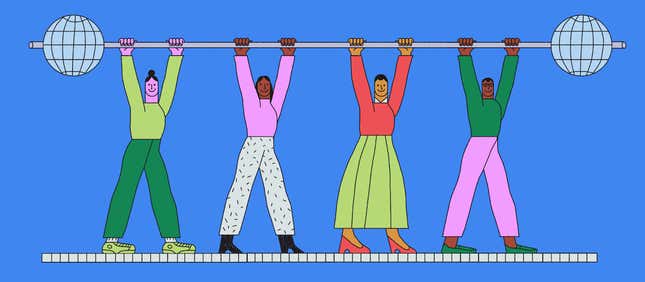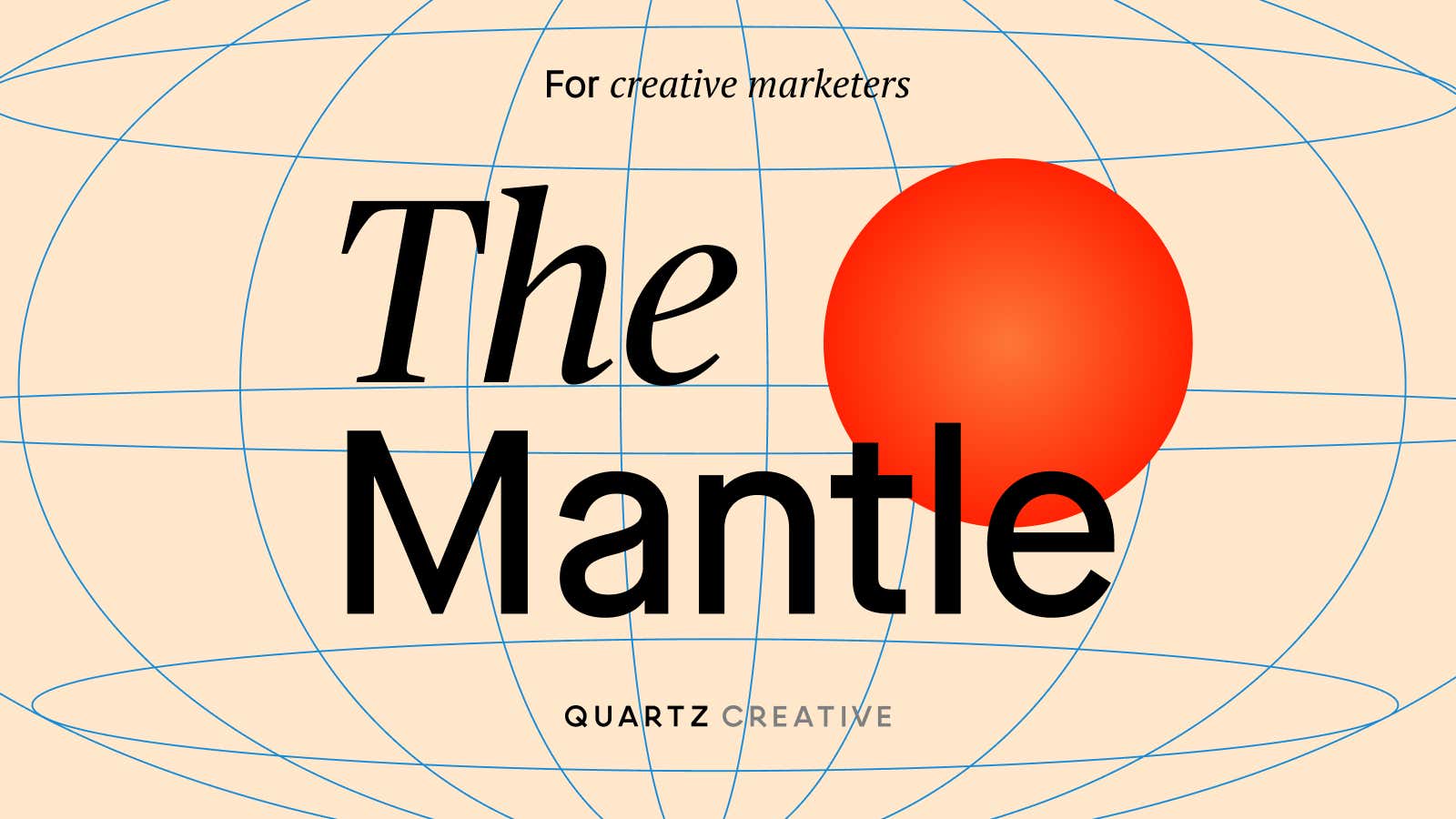Welcome back to The Mantle, your monthly download on all the marketing trends and industry insights brewing below the surface, courtesy of Quartz’s marketing team.
At Quartz, we’re on a mission to make business better by being the greatest ally and resource for purpose-driven professionals in search of new approaches to business. We do this by obsessing on the emerging industries leading change, and connecting that back to how organizations and individuals can make an impact.
Supporting our mission is the number one reason readers subscribe to Quartz. When recently surveyed, 93% of Quartz readers said they believe organizations should be mission-driven and are more inclined to support a business with a purpose-driven mission. Edelman’s Trust Barometer 2022 (Quartz’s TL;DR version) overwhelmingly indicated that businesses are not doing enough to address societal issues from climate change, economic inequality, and workplace reskilling.
Studies show that purpose drives innovation, builds brand loyalty, and attracts investors to your business. Follow along as we explore how purpose is a core business differentiator, what matters most to your stakeholders, and how to market to purpose-driven professionals.
— Natalie Diamond, CRO, Quartz

The power of purpose and why it matters more now
We sat down with fellow Quartzian and senior reporter, Cassie Werber, who writes about the world of work, to find out what purpose represents for business.
How is purpose changing in business?
Increasingly, companies are realizing they’re not just responsible for making money, and discovering a responsibility to their employees and communities. Business leaders look at what is happening in society, geopolitically, and in the climate, and some are shifting to “stakeholder” capitalism, which can take in anything from paying fair wages to investing in local communities, mitigating environmental harm or making their advertising more honest.
How is purpose changing for employees?
A lot of employees think deeply about global problems and want to help solve them. More and more, they’re seeking purpose at work, and need to find meaning in their daily work in order to be fully engaged.
If we’re privileged to work in industries where we have the time to think about why we are doing what we’re doing, we need to have a good answer to that. Some industries do now have a bad reputation; you’ll even hear people prefacing an introduction to their job with “I’m one of those awful bankers,” or whatever. We’re very self-aware, now. People might be working in an industry they’re not fully on board with and asking themselves: What can I do to make a difference?
Do you believe that there are some businesses that genuinely want to make a net positive impact versus some that are most interested in profit and good PR?
Yes. But unfortunately there’s been a huge amount of noise in this area, because there’s so much pressure on businesses to say this/do that. Nowadays, most companies have a list of things they say they’re doing to be more sustainable and more equitable. Some of it simply isn’t true. One of the challenges in covering this space is trying to work out what is.
How do we sift through what’s real and what’s inauthentic?
As a journalist, I want to cover businesses that are making positive changes in a new way. I dig into: how are they doing it, how can it be useful to others who want to make change, and how do you sort through the “greenwashing” and “wokewashing?”
There’s still a gray area that’s hard for consumers to judge. Hopefully, with more tools in place, like transparency reporting and rigorous certification processes—like B Corp—we’re more able to hold companies to account.
Social media also provides more ways to expose egregious behavior. What will bubble to the surface are the companies really following through and making incremental, sustainable change.
Why is this the moment things have changed? Why now?
It’s a collection of things. There’s a major shift in focus of our governments’ and businesses’ realization that they need to address historic, ingrained problems. The internet has empowered a lot of people. We’re seeing the fruits of that now twenty years later. Even the pandemic has empowered employees in some ways.
It took an incredibly long time for climate change science to genuinely penetrate all the strata of society, but I think that’s now happened in most places. There have been certain inflection points, like the movements sparked by George Floyd and MeToo.

What B Corps can teach other companies about success and growth
Generally B Corps are companies that have decided to make purpose very central to what they do. Or they think it’s already central, and they want to prove it. They’re willing to commit to outside scrutiny and make changes they need to make. Going through a rigorous certification process will definitely expose any problems and any places they are failing.
B Corps are exposing themselves in the pursuit of change and can teach other businesses a lot about what it means to be successful. People want to be part of the community and associated with business as a force for good movement. They want their consumers to know it and be known for it. Not every company does it for public image alone. Some embedded purpose into their business from the beginning but never publicized it. B Corp gives them a chance to showcase that.
Want to learn more about B Corps? March is B Corp month. Join us for a special Quartz x B Lab U.S. & Canada event, The B Corp Moment: Why so many companies realize more than just profit next Wednesday, March 23 at 1 – 2 pm ET.
By the digits
93% of Quartz readers believe organizations should be mission-driven.
73% of Quartz readers want to affect real change in the work through their work and believe they can.
60% of Quartz readers are obsessed with Climate and Sustainability.
80% of people surveyed by Edelman’s Trust Barometer 2022 (pdf), want CEOs to be personally visible when discussing public policy or work their company has done to benefit society and the environment.
58% of Edelman respondents buy or advocate for brands based on their beliefs and values.
What to be on the lookout for
Change is necessary: your businesses’ survival depends on it
Like the advent of the internet twenty years ago, those who changed, often radically, prevailed. We’re going to see the same with purpose-driven businesses, according to Accenture.
And those who failed to evolve? “Many of those companies are gone. They don’t exist,” said Blair Taylor, managing director of talent and organization at Accenture, and the consultancy’s North American lead on DEI. According to Taylor, we’re at a similar inflection point when it comes to sustainability.
Companies continue to witness hundreds of thousands of employees walking out over climate issues and recurrent high-profile petitions raised around social conscious interest groups.
Meaningful topline growth
Consumers reward authentic, purpose-driven brands with more revenue, affinity, and trust. Purpose-driven companies witness higher market share gains and grow three times faster on average than their competitors, all while achieving higher workforce and customer satisfaction.
47% of consumers who are disappointed with a brand’s stance on a social issue will stop buying its products—and 17% will never return. Purpose-driven brands increase customer loyalty, foster trust, and preserve your customer base.
Uptick in B Corp certifications
We are seeing year over year growth in B Corp certifications—a 28% increase in 2021 alone. When sharing the news, it’s all about telling your company’s story: who you are, how you will commit, and what you have to offer.
Marketing as your tool for transparency and quality
Make it clear what people can expect from your business. This is an opportunity to create value and drive progress across Environmental, Social, Governance (ESG) themes. Purpose makes your business more attractive to clients and investors. Advertising can actually be great and useful and honestly labeled and, at the end of the day, just a good piece of content.
The ultimate value prop: aligning purpose and strategy
Inspire your team to think creatively about your value proposition and how it links to purpose—and then encourage rigor in embedding it in your company’s core.
The power of storytelling
Storytelling is not new. But sourcing new ways to elevate your brand and connect to your audience can be. See how B the Change are stories of people using business as a force for good.
“The brands that will thrive in the coming years are the ones that have a purpose beyond profit.”
— Sir Richard Branson, business entrepreneur

Does your brand “mean more” to your stakeholders?
Make purpose the blueprint to your business. Successful purpose-driven brands incorporate beliefs and values into the very core of their business. Here are a few leading the way:
🥾 With its long history as a B Corp that integrates sustainability and business, Patagonia bucks corporate trends and isn’t afraid to get political.
💤 Leesa has donated over 37,000 mattresses to those in need. Their motto: you get good sleep and it does good for families in need. That’s GOOD & good.
🧘🏾♀️ Athleta’s brand supports the lives of the majority-female workers that create its apparel and runs empowerment-focused campaigns such as “Power of She.“
💵 Blackrock’s annual CEO letter is dedicated to elevating stakeholder capitalism.
Handpicked Quartz
Check out some required reading for ad execs and marketing pioneers:
- The purpose of B Corps and The new purpose of companies by Quartz
- Nine promising startups delivering both impact and investment potential by Alumni Ventures
- Companies that fail at sustainability will soon start to fail at business by Quartz
- How brands that authentically lead with purpose are changing the nature of business today by Deloitte
- Better Business: How the B Corp movement is remaking capitalism by Christopher Marquis
See you soon
Thanks for tuning into this months’ edition of The Mantle. If you have any empowering apparel, impact startups or ESG themes, send them on over to marketing@qz.com. See you soon!
